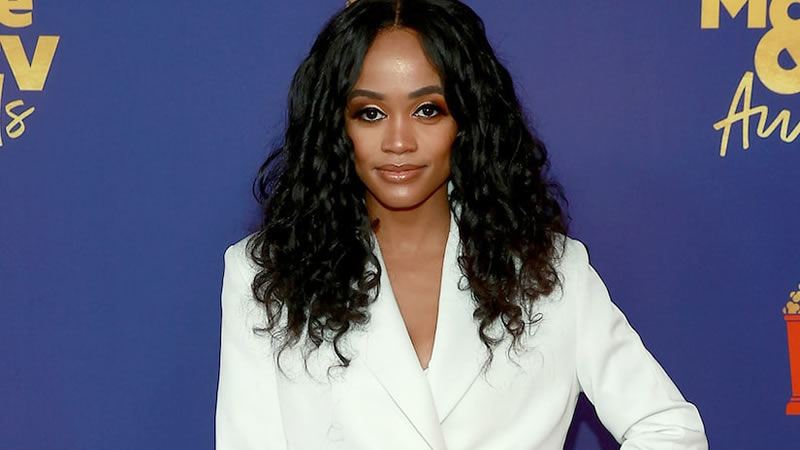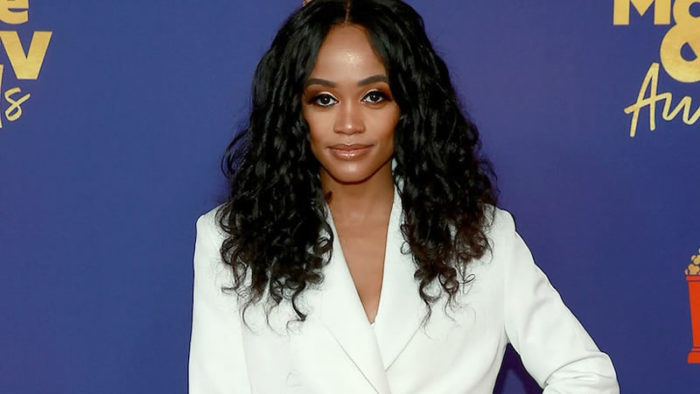Rachel Lindsay is speaking out about a “toxic” subset of “The Bachelor” franchise’s fandom — and the moment she felt it turned against her.
In a lengthy and honest op-ed for New York Magazine, the reality star and first Black Bachelorette detailed her experience with the franchise, from the moment she was cast in Nick Viall’s season of “The Bachelor” to the present day. And Lindsay, 36, didn’t hold back.
The “EXTRA” host discussed her viral interview with Chris Harrison from back in February, in which Harrison defended “Bachelor” contestant Rachael Kirkconnell over her past racist behavior. Harrison apologized and announced he was temporarily stepping down as host before he later revealed he was leaving the franchise altogether.
While Lindsay said the fandom had a “complicated relationship” with her during her time with the franchise, she said it “really started to turn against” her following the interview. Many viewers believed, according to Lindsay, she was the “one responsible” for Harrison’s departure.

“In 2018, I felt like I had changed the franchise just by representing myself as a Black professional woman in her 30s — those things had never before been seen on the series,” Lindsay wrote. “In the years since, I had gone from a former contestant who advocated for more diversity to one who spoke critically about the show and tried to hold those involved with it accountable.”
She continued, “By the time that segment with Chris aired, I was known as the contestant who was always starting trouble. ‘That Rachel Lindsay,’ the one who couldn’t stay quiet, who bites the hand that feeds, Bachelor Nation’s public enemy No. 1. Later, I would be known as the one responsible for Harrison’s eventually leaving the franchise.”
The lawyer stepped away from her podcast, “Bachelor Happy Hour,” last month. “After 100 episodes, I announced my departure from that podcast,” she explained in the New York Magazine piece, adding, “I’m exhausted from defending myself against a toxic fandom.”
“The fandom had always had a complicated relationship with me. But it really started to turn against me after that interview,” Lindsay explained later in the op-ed. “The franchise has spent 19 years cultivating a toxic audience. They have constantly given it a product it wants: a midwestern/southern white, blonde, light-eyed Christian.”
However, Lindsay pointed out that “not all viewers are like that.”
“My ‘Higher Learning’ co-host and I have divided it — there is a Bachelor Nation, and there is a Bachelor Klan,” she said. “Bachelor Klan is hateful, racist, misogynistic, xenophobic, and homophobic. They are afraid of change. They are afraid to be uncomfortable. They are afraid when they get called out.”
“Some fans on social media started trying to dig up dirt on me. I received death threats and personal attacks,” she claimed. “I had to hire people to protect me. I couldn’t even pretend to want to be involved anymore.
I didn’t want to give people a reason to talk about me because everything I was saying was becoming a headline. And so I decided to remove myself from it all.”
While recalling her experience on “The Bachelorette,” specifically, earlier in her essay, Lindsay said she felt “exploited” by the reality show when she went to Peter Kraus’ hometown and was introduced to Kraus’ friends: two interracial couples.
“I walked in and saw two Black men and two white women sitting at a table,” Lindsay wrote. “[Producers] separated us — Peter got to talk to his homeboys, and I was with the women, who talked about having ‘mixed babies’ and what it was like to be an interracial couple.
I couldn’t believe it. I’m Black. I have interracial couples in my family. I’m old enough to understand what I’m entering into and the difficulties that come with it. I felt exploited.”
“If anything, that situation turned me off of Peter because I couldn’t see myself hanging out with them,” she continued. “They were nice, but it was so contrived. The producers really thought, ‘How great! All these mixed couples can come together.’ They were only looking at the optics of the situation.”
After Lindsay’s New York Magazine essay was published, Lindsay took to Instagram to express her disappointment over the headline featured on the print cover. Although the story’s headline — both inside the magazine and online — reads, “Rachel Lindsay Has No Roses Left to Burn,” the cover features the title, “Oops, I Blew Up the Bachelor.”
“I worked with New York Magazine very closely on a cover feature where I was given the opportunity to tell my story and share my experience with the Bachelor franchise,” Lindsay wrote in a statement.
“It was deeply personal but I felt it was important to share. While it was a very collaborative experience, they decided to misrepresent me with the headline that was chosen for the cover. Those are not my words nor are they a reflection of how I feel. In fact, it was a stark contrast to the context of the piece.”
Lindsay continued, “For me, it is very disappointing and disrespectful that the very notion I was trying to refute was used against me by the publication for a clickbait headline. My truth and my thoughts are told on the inside of the magazine which I am very proud of and hope you all read.”
View this post on Instagram
New York Magazine released a statement in response to Lindsay’s post.
“New York Magazine is incredibly proud to have published Rachel Lindsay’s powerful, first-person story, detailing her experience with the ‘Bachelor’ franchise,” a spokesperson told The Wrap.
“We were sorry to learn that she is unhappy with the cover line (which was not meant as a direct quote), but it shouldn’t take away from the candor and bravery of her words in the piece.”


